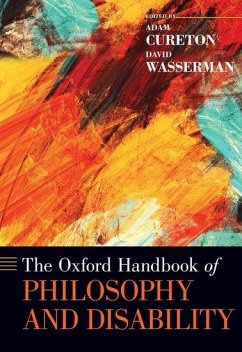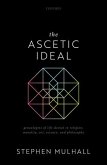The Oxford Handbook of Philosophy and Disability
Herausgeber: Cureton, Adam; Wasserman, David
The Oxford Handbook of Philosophy and Disability
Herausgeber: Cureton, Adam; Wasserman, David
- Gebundenes Buch
- Merkliste
- Auf die Merkliste
- Bewerten Bewerten
- Teilen
- Produkt teilen
- Produkterinnerung
- Produkterinnerung
This Handbook introduces philosophers, as well as other scholars in the humanities and social sciences, to one of the most dynamic new areas of philosophical inquiry. Disability raises some of the deepest conceptual and normative issues about human embodiment and well-being; dignity, respect, justice and equality; and personal and social identity. But it also raises pressing practical questions for educational, health, reproductive, and technology policy, and confronts controversial questions about the scope and direction of the human and civil rights movements. The Handbook addresses these…mehr
Andere Kunden interessierten sich auch für
![The Oxford Handbook of Moral Responsibility The Oxford Handbook of Moral Responsibility]() The Oxford Handbook of Moral Responsibility246,99 €
The Oxford Handbook of Moral Responsibility246,99 €![The Oxford Handbook of Moral Realism The Oxford Handbook of Moral Realism]() David CoppThe Oxford Handbook of Moral Realism198,99 €
David CoppThe Oxford Handbook of Moral Realism198,99 €![The Oxford Handbook of Consequentialism The Oxford Handbook of Consequentialism]() The Oxford Handbook of Consequentialism233,99 €
The Oxford Handbook of Consequentialism233,99 €![The Oxford Handbook of Moral Psychology The Oxford Handbook of Moral Psychology]() The Oxford Handbook of Moral Psychology287,99 €
The Oxford Handbook of Moral Psychology287,99 €![The Oxford Handbook of Philosophy of Technology The Oxford Handbook of Philosophy of Technology]() The Oxford Handbook of Philosophy of Technology233,99 €
The Oxford Handbook of Philosophy of Technology233,99 €![The Oxford Handbook of Philosophy of Religion The Oxford Handbook of Philosophy of Religion]() William Wainwright (ed.)The Oxford Handbook of Philosophy of Religion56,99 €
William Wainwright (ed.)The Oxford Handbook of Philosophy of Religion56,99 €![The Ascetic Ideal The Ascetic Ideal]() Stephen MulhallThe Ascetic Ideal116,99 €
Stephen MulhallThe Ascetic Ideal116,99 €-
-
-
This Handbook introduces philosophers, as well as other scholars in the humanities and social sciences, to one of the most dynamic new areas of philosophical inquiry. Disability raises some of the deepest conceptual and normative issues about human embodiment and well-being; dignity, respect, justice and equality; and personal and social identity. But it also raises pressing practical questions for educational, health, reproductive, and technology policy, and confronts controversial questions about the scope and direction of the human and civil rights movements. The Handbook addresses these issues and more, with contributions from some of the most prominent philosophers in the field. The clarity it brings to these discussions demonstrates fully the continued centrality and importance of philosophical inquiry.
Hinweis: Dieser Artikel kann nur an eine deutsche Lieferadresse ausgeliefert werden.
Hinweis: Dieser Artikel kann nur an eine deutsche Lieferadresse ausgeliefert werden.
Produktdetails
- Produktdetails
- Verlag: Hurst & Co.
- Seitenzahl: 848
- Erscheinungstermin: 23. Juni 2020
- Englisch
- Abmessung: 249mm x 175mm x 56mm
- Gewicht: 1520g
- ISBN-13: 9780190622879
- ISBN-10: 0190622873
- Artikelnr.: 58305459
- Herstellerkennzeichnung
- Libri GmbH
- Europaallee 1
- 36244 Bad Hersfeld
- gpsr@libri.de
- Verlag: Hurst & Co.
- Seitenzahl: 848
- Erscheinungstermin: 23. Juni 2020
- Englisch
- Abmessung: 249mm x 175mm x 56mm
- Gewicht: 1520g
- ISBN-13: 9780190622879
- ISBN-10: 0190622873
- Artikelnr.: 58305459
- Herstellerkennzeichnung
- Libri GmbH
- Europaallee 1
- 36244 Bad Hersfeld
- gpsr@libri.de
Adam Cureton is Associate Professor of Philosophy at the University of Tennessee. He co-edited (with Kimberley Brownlee) Disability and Disadvantage (2009) and (with Thomas E. Hill) Disability in Practice: Attitudes Policies and Relationships (2018), both for Oxford University Press. He is the President of the Society for Philosophy and Disability. David Wasserman is on the faculty of the Clinical Center Department of Bioethics at the National Institutes of Health. He works primarily on ethical and policy issues in disability, genetics, reproduction, and neuroscience. He is co-author, with David Benatar, of Debating Procreation (Oxford, 2015).
* Introduction
* Adam Cureton and David Wasserman
* Part I: Concepts, Models and Perspectives of Disability
* Chapter 1: In Pursuit of Justice for Disability: Model Neutrality
Revisited
* Anita Silvers
* Chapter 2: Theoretical Strategies to Define Disability
* Jonas-Sébastien Beaudry
* Chapter 3: Disability, Health, and Difference
* Jerome Bickenbach
* Chapter 4: Habilitative Health and Disability
* Lawrence C. Becker
* Chapter 5: Philosophy and the Apparatus of Disability
* Shelley L. Tremain
* Chapter 6: Disability Liberation Theology
* Rosemarie Garland-Thomson
* Part II: Well-Being, Adaptation, and Causing Disability
* Chapter 7: Disabilities and Wellbeing: The Bad and the Neutral
* Joshua Shepherd
* Chapter 8: Causing Disability, Causing Non-Disability: What's the
Moral Difference?
* Joseph A. Stramondo and Stephen M. Campbell
* Chapter 9: Why Inflicting Disability is Wrong: The Mere Difference
View and The Causation Based Objection
* Julia Mosquera
* Chapter 10: Evaluative Diversity and the (Ir)Relevance of Well-Being
* Sean Aas
* Part III: Justice, Equality, and Inclusion
* Chapter 11: Contractualism, Disability, and Inclusion
* Christie Hartley
* Chapter 12: Civic Republican Disability Justice
* Tom O'Shea
* Chapter 13: Disability and Disadvantage in the Capabilities Approach
* Christopher A. Riddle
* Chapter 14: Disability and Partial Compliance Theory
* Leslie Francis
* Chapter 15: Fair Difference of Opportunity
* Adam Cureton and Alexander Kaufman
* Chapter 16: The Disability Case against Assisted Dying
* Danny Scoccia
* Part IV: Knowledge and Embodiment
* Chapter 17: Epistemic Exclusion, Injustice, and Disability
* Jackie Leach Scully
* Chapter 18: What's Wrong With "You Say You're Happy, But " Reasoning?
* Jason Marsh
* Chapter 19: Interactions with Delusional Others: Reflections on
Epistemic Failures and Virtues
* Josh Dohmen
* Chapter 20: Disability, Rationality, and Justice: Disambiguating
Adaptive Preferences
* Jessica Begon
* Part V: Respect, Appreciation, and Care
* Chapter 21: Ideals of Appreciation and Expressions of Respect
* Thomas E. Hill, Jr.
* Chapter 22: The Limiting Role of Respect
* Adam Cureton
* Chapter 23: Respect, Identification, and Profound Cognitive
Impairment
* John Vorhaus
* Chapter 24: Care and Disability: Friends or Foes
* Eva Kittay
* Chapter 25: A Dignitarian Approach to Disability: From Moral Status
to Social Status
* Linda Barclay
* Part VI: Moral Status and Significant Mental Disabilities
* Chapter 26: Cognitive Disability and Moral Status
* Alice Crary
* Chapter 27: Dignity, Respect, and Cognitive Disability
* Suzy Killmister
* Chapter 28: On Moral Status and Intellectual Disability: Challenging
and Expanding the Debates
* Licia Carlson
* Part VI: Intellectual and Psychiatric Disability
* Chapter 29: Neurodiversity, Autism, and Psychiatric Disability: The
Harmful Dysfunction Perspective
* Jerome C. Wakefield, David Wasserman, and Jordan A. Conrad
* Chapter 30: Beyond Instrumental Value: Respecting the Will of Others
and Deciding on Their Behalf
* Dana Howard and David Wendler
* Chapter 31: Educational Justice for People with Intellectual
Disabilities
* Lorella Terzi
* Part VIII: Technology and Enhancement
* Chapter 32: A Symmetrical View of Disability and Enhancement
* Stephen M. Campbell and David Wasserman
* Chapter 33: Cognitive Disability and Embodied, Extended Minds
* Zoe Drayson and Andy Clark
* Chapter 34: The Visible and the Invisible: Disability, Assistive
Technology, and Stigma
* Coreen McGuire and Havi Carel
* Chapter 35: Neurotechnologies and Justice by, with, and for Disabled
People
* Sara Goering and Eran Klein
* Chapter 36: Second Thoughts on Enhancement and Disability
* Melinda C. Hall
* Part IX: Healthcare Allocation and Assisted Death
* Chapter 37: Cost-Effectiveness Analysis and Disability Discrimination
* Greg Bognar
* Chapter 38: Prioritisation and Parity. Which Disabled Newborn Infants
Should be Candidates for Scarce Life-Saving Treatment?
* Dominic JC Wilkinson and Julian Savulescu
* Part X: Reproduction and Parenting
* Chapter 39: Why People with Cognitive Disabilities are Justified in
Feeling Disquieted by Prenatal Testing and Selective Termination
* Chris Kaposy
* Chapter 40: Reproductive Choice, in Context: Avoiding Excess and
Deficiency?
* Richard Hull and Tom Shakespeare
* Chapter 41: Bioethics, Disability, and Selective Reproductive
Technology: Taking Intersectionality Seriously
* Christian Munthe
* Chapter 42: Procreation and Intellectual Disability: A Kantian
Approach
* Samuel J. Kerstein
* Chapter 43: Parental Autonomy, Children with Disabilities, and
Horizontal Identities
* Mary Crossley
* Adam Cureton and David Wasserman
* Part I: Concepts, Models and Perspectives of Disability
* Chapter 1: In Pursuit of Justice for Disability: Model Neutrality
Revisited
* Anita Silvers
* Chapter 2: Theoretical Strategies to Define Disability
* Jonas-Sébastien Beaudry
* Chapter 3: Disability, Health, and Difference
* Jerome Bickenbach
* Chapter 4: Habilitative Health and Disability
* Lawrence C. Becker
* Chapter 5: Philosophy and the Apparatus of Disability
* Shelley L. Tremain
* Chapter 6: Disability Liberation Theology
* Rosemarie Garland-Thomson
* Part II: Well-Being, Adaptation, and Causing Disability
* Chapter 7: Disabilities and Wellbeing: The Bad and the Neutral
* Joshua Shepherd
* Chapter 8: Causing Disability, Causing Non-Disability: What's the
Moral Difference?
* Joseph A. Stramondo and Stephen M. Campbell
* Chapter 9: Why Inflicting Disability is Wrong: The Mere Difference
View and The Causation Based Objection
* Julia Mosquera
* Chapter 10: Evaluative Diversity and the (Ir)Relevance of Well-Being
* Sean Aas
* Part III: Justice, Equality, and Inclusion
* Chapter 11: Contractualism, Disability, and Inclusion
* Christie Hartley
* Chapter 12: Civic Republican Disability Justice
* Tom O'Shea
* Chapter 13: Disability and Disadvantage in the Capabilities Approach
* Christopher A. Riddle
* Chapter 14: Disability and Partial Compliance Theory
* Leslie Francis
* Chapter 15: Fair Difference of Opportunity
* Adam Cureton and Alexander Kaufman
* Chapter 16: The Disability Case against Assisted Dying
* Danny Scoccia
* Part IV: Knowledge and Embodiment
* Chapter 17: Epistemic Exclusion, Injustice, and Disability
* Jackie Leach Scully
* Chapter 18: What's Wrong With "You Say You're Happy, But " Reasoning?
* Jason Marsh
* Chapter 19: Interactions with Delusional Others: Reflections on
Epistemic Failures and Virtues
* Josh Dohmen
* Chapter 20: Disability, Rationality, and Justice: Disambiguating
Adaptive Preferences
* Jessica Begon
* Part V: Respect, Appreciation, and Care
* Chapter 21: Ideals of Appreciation and Expressions of Respect
* Thomas E. Hill, Jr.
* Chapter 22: The Limiting Role of Respect
* Adam Cureton
* Chapter 23: Respect, Identification, and Profound Cognitive
Impairment
* John Vorhaus
* Chapter 24: Care and Disability: Friends or Foes
* Eva Kittay
* Chapter 25: A Dignitarian Approach to Disability: From Moral Status
to Social Status
* Linda Barclay
* Part VI: Moral Status and Significant Mental Disabilities
* Chapter 26: Cognitive Disability and Moral Status
* Alice Crary
* Chapter 27: Dignity, Respect, and Cognitive Disability
* Suzy Killmister
* Chapter 28: On Moral Status and Intellectual Disability: Challenging
and Expanding the Debates
* Licia Carlson
* Part VI: Intellectual and Psychiatric Disability
* Chapter 29: Neurodiversity, Autism, and Psychiatric Disability: The
Harmful Dysfunction Perspective
* Jerome C. Wakefield, David Wasserman, and Jordan A. Conrad
* Chapter 30: Beyond Instrumental Value: Respecting the Will of Others
and Deciding on Their Behalf
* Dana Howard and David Wendler
* Chapter 31: Educational Justice for People with Intellectual
Disabilities
* Lorella Terzi
* Part VIII: Technology and Enhancement
* Chapter 32: A Symmetrical View of Disability and Enhancement
* Stephen M. Campbell and David Wasserman
* Chapter 33: Cognitive Disability and Embodied, Extended Minds
* Zoe Drayson and Andy Clark
* Chapter 34: The Visible and the Invisible: Disability, Assistive
Technology, and Stigma
* Coreen McGuire and Havi Carel
* Chapter 35: Neurotechnologies and Justice by, with, and for Disabled
People
* Sara Goering and Eran Klein
* Chapter 36: Second Thoughts on Enhancement and Disability
* Melinda C. Hall
* Part IX: Healthcare Allocation and Assisted Death
* Chapter 37: Cost-Effectiveness Analysis and Disability Discrimination
* Greg Bognar
* Chapter 38: Prioritisation and Parity. Which Disabled Newborn Infants
Should be Candidates for Scarce Life-Saving Treatment?
* Dominic JC Wilkinson and Julian Savulescu
* Part X: Reproduction and Parenting
* Chapter 39: Why People with Cognitive Disabilities are Justified in
Feeling Disquieted by Prenatal Testing and Selective Termination
* Chris Kaposy
* Chapter 40: Reproductive Choice, in Context: Avoiding Excess and
Deficiency?
* Richard Hull and Tom Shakespeare
* Chapter 41: Bioethics, Disability, and Selective Reproductive
Technology: Taking Intersectionality Seriously
* Christian Munthe
* Chapter 42: Procreation and Intellectual Disability: A Kantian
Approach
* Samuel J. Kerstein
* Chapter 43: Parental Autonomy, Children with Disabilities, and
Horizontal Identities
* Mary Crossley
* Introduction
* Adam Cureton and David Wasserman
* Part I: Concepts, Models and Perspectives of Disability
* Chapter 1: In Pursuit of Justice for Disability: Model Neutrality
Revisited
* Anita Silvers
* Chapter 2: Theoretical Strategies to Define Disability
* Jonas-Sébastien Beaudry
* Chapter 3: Disability, Health, and Difference
* Jerome Bickenbach
* Chapter 4: Habilitative Health and Disability
* Lawrence C. Becker
* Chapter 5: Philosophy and the Apparatus of Disability
* Shelley L. Tremain
* Chapter 6: Disability Liberation Theology
* Rosemarie Garland-Thomson
* Part II: Well-Being, Adaptation, and Causing Disability
* Chapter 7: Disabilities and Wellbeing: The Bad and the Neutral
* Joshua Shepherd
* Chapter 8: Causing Disability, Causing Non-Disability: What's the
Moral Difference?
* Joseph A. Stramondo and Stephen M. Campbell
* Chapter 9: Why Inflicting Disability is Wrong: The Mere Difference
View and The Causation Based Objection
* Julia Mosquera
* Chapter 10: Evaluative Diversity and the (Ir)Relevance of Well-Being
* Sean Aas
* Part III: Justice, Equality, and Inclusion
* Chapter 11: Contractualism, Disability, and Inclusion
* Christie Hartley
* Chapter 12: Civic Republican Disability Justice
* Tom O'Shea
* Chapter 13: Disability and Disadvantage in the Capabilities Approach
* Christopher A. Riddle
* Chapter 14: Disability and Partial Compliance Theory
* Leslie Francis
* Chapter 15: Fair Difference of Opportunity
* Adam Cureton and Alexander Kaufman
* Chapter 16: The Disability Case against Assisted Dying
* Danny Scoccia
* Part IV: Knowledge and Embodiment
* Chapter 17: Epistemic Exclusion, Injustice, and Disability
* Jackie Leach Scully
* Chapter 18: What's Wrong With "You Say You're Happy, But " Reasoning?
* Jason Marsh
* Chapter 19: Interactions with Delusional Others: Reflections on
Epistemic Failures and Virtues
* Josh Dohmen
* Chapter 20: Disability, Rationality, and Justice: Disambiguating
Adaptive Preferences
* Jessica Begon
* Part V: Respect, Appreciation, and Care
* Chapter 21: Ideals of Appreciation and Expressions of Respect
* Thomas E. Hill, Jr.
* Chapter 22: The Limiting Role of Respect
* Adam Cureton
* Chapter 23: Respect, Identification, and Profound Cognitive
Impairment
* John Vorhaus
* Chapter 24: Care and Disability: Friends or Foes
* Eva Kittay
* Chapter 25: A Dignitarian Approach to Disability: From Moral Status
to Social Status
* Linda Barclay
* Part VI: Moral Status and Significant Mental Disabilities
* Chapter 26: Cognitive Disability and Moral Status
* Alice Crary
* Chapter 27: Dignity, Respect, and Cognitive Disability
* Suzy Killmister
* Chapter 28: On Moral Status and Intellectual Disability: Challenging
and Expanding the Debates
* Licia Carlson
* Part VI: Intellectual and Psychiatric Disability
* Chapter 29: Neurodiversity, Autism, and Psychiatric Disability: The
Harmful Dysfunction Perspective
* Jerome C. Wakefield, David Wasserman, and Jordan A. Conrad
* Chapter 30: Beyond Instrumental Value: Respecting the Will of Others
and Deciding on Their Behalf
* Dana Howard and David Wendler
* Chapter 31: Educational Justice for People with Intellectual
Disabilities
* Lorella Terzi
* Part VIII: Technology and Enhancement
* Chapter 32: A Symmetrical View of Disability and Enhancement
* Stephen M. Campbell and David Wasserman
* Chapter 33: Cognitive Disability and Embodied, Extended Minds
* Zoe Drayson and Andy Clark
* Chapter 34: The Visible and the Invisible: Disability, Assistive
Technology, and Stigma
* Coreen McGuire and Havi Carel
* Chapter 35: Neurotechnologies and Justice by, with, and for Disabled
People
* Sara Goering and Eran Klein
* Chapter 36: Second Thoughts on Enhancement and Disability
* Melinda C. Hall
* Part IX: Healthcare Allocation and Assisted Death
* Chapter 37: Cost-Effectiveness Analysis and Disability Discrimination
* Greg Bognar
* Chapter 38: Prioritisation and Parity. Which Disabled Newborn Infants
Should be Candidates for Scarce Life-Saving Treatment?
* Dominic JC Wilkinson and Julian Savulescu
* Part X: Reproduction and Parenting
* Chapter 39: Why People with Cognitive Disabilities are Justified in
Feeling Disquieted by Prenatal Testing and Selective Termination
* Chris Kaposy
* Chapter 40: Reproductive Choice, in Context: Avoiding Excess and
Deficiency?
* Richard Hull and Tom Shakespeare
* Chapter 41: Bioethics, Disability, and Selective Reproductive
Technology: Taking Intersectionality Seriously
* Christian Munthe
* Chapter 42: Procreation and Intellectual Disability: A Kantian
Approach
* Samuel J. Kerstein
* Chapter 43: Parental Autonomy, Children with Disabilities, and
Horizontal Identities
* Mary Crossley
* Adam Cureton and David Wasserman
* Part I: Concepts, Models and Perspectives of Disability
* Chapter 1: In Pursuit of Justice for Disability: Model Neutrality
Revisited
* Anita Silvers
* Chapter 2: Theoretical Strategies to Define Disability
* Jonas-Sébastien Beaudry
* Chapter 3: Disability, Health, and Difference
* Jerome Bickenbach
* Chapter 4: Habilitative Health and Disability
* Lawrence C. Becker
* Chapter 5: Philosophy and the Apparatus of Disability
* Shelley L. Tremain
* Chapter 6: Disability Liberation Theology
* Rosemarie Garland-Thomson
* Part II: Well-Being, Adaptation, and Causing Disability
* Chapter 7: Disabilities and Wellbeing: The Bad and the Neutral
* Joshua Shepherd
* Chapter 8: Causing Disability, Causing Non-Disability: What's the
Moral Difference?
* Joseph A. Stramondo and Stephen M. Campbell
* Chapter 9: Why Inflicting Disability is Wrong: The Mere Difference
View and The Causation Based Objection
* Julia Mosquera
* Chapter 10: Evaluative Diversity and the (Ir)Relevance of Well-Being
* Sean Aas
* Part III: Justice, Equality, and Inclusion
* Chapter 11: Contractualism, Disability, and Inclusion
* Christie Hartley
* Chapter 12: Civic Republican Disability Justice
* Tom O'Shea
* Chapter 13: Disability and Disadvantage in the Capabilities Approach
* Christopher A. Riddle
* Chapter 14: Disability and Partial Compliance Theory
* Leslie Francis
* Chapter 15: Fair Difference of Opportunity
* Adam Cureton and Alexander Kaufman
* Chapter 16: The Disability Case against Assisted Dying
* Danny Scoccia
* Part IV: Knowledge and Embodiment
* Chapter 17: Epistemic Exclusion, Injustice, and Disability
* Jackie Leach Scully
* Chapter 18: What's Wrong With "You Say You're Happy, But " Reasoning?
* Jason Marsh
* Chapter 19: Interactions with Delusional Others: Reflections on
Epistemic Failures and Virtues
* Josh Dohmen
* Chapter 20: Disability, Rationality, and Justice: Disambiguating
Adaptive Preferences
* Jessica Begon
* Part V: Respect, Appreciation, and Care
* Chapter 21: Ideals of Appreciation and Expressions of Respect
* Thomas E. Hill, Jr.
* Chapter 22: The Limiting Role of Respect
* Adam Cureton
* Chapter 23: Respect, Identification, and Profound Cognitive
Impairment
* John Vorhaus
* Chapter 24: Care and Disability: Friends or Foes
* Eva Kittay
* Chapter 25: A Dignitarian Approach to Disability: From Moral Status
to Social Status
* Linda Barclay
* Part VI: Moral Status and Significant Mental Disabilities
* Chapter 26: Cognitive Disability and Moral Status
* Alice Crary
* Chapter 27: Dignity, Respect, and Cognitive Disability
* Suzy Killmister
* Chapter 28: On Moral Status and Intellectual Disability: Challenging
and Expanding the Debates
* Licia Carlson
* Part VI: Intellectual and Psychiatric Disability
* Chapter 29: Neurodiversity, Autism, and Psychiatric Disability: The
Harmful Dysfunction Perspective
* Jerome C. Wakefield, David Wasserman, and Jordan A. Conrad
* Chapter 30: Beyond Instrumental Value: Respecting the Will of Others
and Deciding on Their Behalf
* Dana Howard and David Wendler
* Chapter 31: Educational Justice for People with Intellectual
Disabilities
* Lorella Terzi
* Part VIII: Technology and Enhancement
* Chapter 32: A Symmetrical View of Disability and Enhancement
* Stephen M. Campbell and David Wasserman
* Chapter 33: Cognitive Disability and Embodied, Extended Minds
* Zoe Drayson and Andy Clark
* Chapter 34: The Visible and the Invisible: Disability, Assistive
Technology, and Stigma
* Coreen McGuire and Havi Carel
* Chapter 35: Neurotechnologies and Justice by, with, and for Disabled
People
* Sara Goering and Eran Klein
* Chapter 36: Second Thoughts on Enhancement and Disability
* Melinda C. Hall
* Part IX: Healthcare Allocation and Assisted Death
* Chapter 37: Cost-Effectiveness Analysis and Disability Discrimination
* Greg Bognar
* Chapter 38: Prioritisation and Parity. Which Disabled Newborn Infants
Should be Candidates for Scarce Life-Saving Treatment?
* Dominic JC Wilkinson and Julian Savulescu
* Part X: Reproduction and Parenting
* Chapter 39: Why People with Cognitive Disabilities are Justified in
Feeling Disquieted by Prenatal Testing and Selective Termination
* Chris Kaposy
* Chapter 40: Reproductive Choice, in Context: Avoiding Excess and
Deficiency?
* Richard Hull and Tom Shakespeare
* Chapter 41: Bioethics, Disability, and Selective Reproductive
Technology: Taking Intersectionality Seriously
* Christian Munthe
* Chapter 42: Procreation and Intellectual Disability: A Kantian
Approach
* Samuel J. Kerstein
* Chapter 43: Parental Autonomy, Children with Disabilities, and
Horizontal Identities
* Mary Crossley








